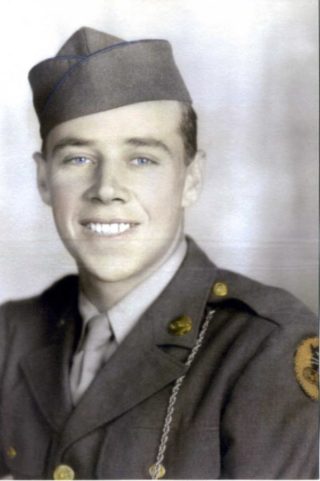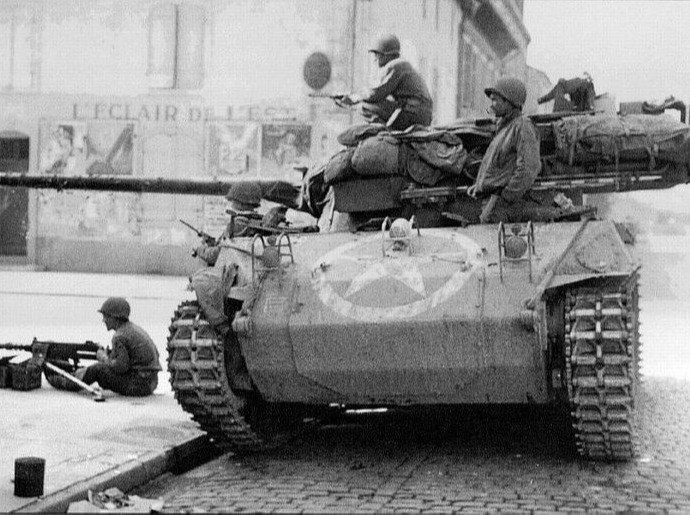James Earl Wilkins Jr. was living in Floydada and had not quite reached his 21st birthday when he attempted to enlist in the Army on Jan. 8, 1942. 
“I had to send a telegram from the Lubbock recruiting station to my mother in Floydada so she could give me permission to enlist. Then you had to be 21 or older. Later, they changed that down to 18,” he recalls.
Military service for Wilkins was a kind of study in travel:
“I was stationed at Fort Ord in California where I took basic training, then went up to Washington to the 2nd Infantry Division, then they shipped me back to California, then Fort Hood in Texas.”
Wilkins joined a tank destroyer unit at Fort Hood.
“I was in that all during the war — a gunner in the 603rd Tank Destroyer Battalion.”
He remembers, “My brother-in-law was the tank commander. He and I had met two ladies in Waco. He married one and I married the other — they happened to be sisters.”
The new in-laws were sent to Europe and attached to the 6th Armored Division under Gen. George S. Patton.
“Blood and Guts Patton,” Wilkins said. “He moved fast — he was a good general. People didn’t like him, but I did because he meant business. Didn’t have to wait around.”
His unit went ashore in the invasion of Normandy after the infantry had established a beachhead and tanks could be moved in.
“We went inland from there,” he said.
Wilkins’ job was to fire a 76mm gun on the tank. “At that time it was the biggest gun on the tanks. They had bigger ones later.”
Inevitably, his tank unit engaged enemy tanks in a sudden-death duel.
“I got credit for knocking out five German Tiger Tanks. When you are in the tank and a big gun is shooting at you, you just don’t know what’s going to happen. You’re scared to death. If you’re not scared, you’re not a soldier.”
The invasion force moved into intense combat, with Germany as the final objective.
“A tank right beside me got hit and blew up,” he remembers of one confrontation. “Good friends of mine. All of them died.”
Another battle proved to be disastrous for the tank unit.
“A tank on that side got hit, and a tank on this side got hit, and my brother-in-law got shot through the face. I helped him out of the tank.”
Wilkins then assumed the role of tank commander.
He remembers the Battle of the Bulge in late December in Bastogne, Belgium, and the bitter cold that was debilitating.
“It was absolutely cold — my feet froze, and I had to stay wrapped up in bandages for a while to get my feet back working.
“They still don’t work right, but they’re there.”
Wilkins was among the American forces to liberate the Nazi concentration camps.
“It was horrible. I went to Dachau, and went to Buchenwald — that was the worst one I was ever in. There were hundreds of men lying there dead, waiting to be burned. They cremated everybody. They had starved them to death.”
He said most were Jewish, but American GIs also had been captured and imprisoned.
“We liberated them,” he said of Buchenwald. “Hundreds of them broke out of that camp when we took the camp. They broke out of the fence and started running everywhere, just hollering and hollering.
“It was a joyful reunion.”
Wilkins said a woman with a reputation for brutality had been in charge of the prison.
Referring to Ilse Koch, who was later prosecuted in the war trials at Nuremberg, he said, “She had a home right there by it. And she had ... I’m not going to tell it ...”
He later returned to the description, and talked of lamp shades made of human skin.
“It was about as cruel as you can get.”
After the war, Koch was sentenced to prison, and committed suicide in the prison.
Wilkins stayed in the Army until after the May 8, 1945, surrender of Germany.
“They sent me back to the states, and I was released from the Army.”
He had reached the rank of sergeant first class, and when there was no work readily available, returned at the same rank and served for a total of 22 years.
Wilkins has no regrets for his service to the nation in World War II.
“During the war, I thought the United States was a wonderful place. That’s the reason I joined up, to go help where I could. Everybody was patriotic, they supported everything, with no argument about this or that, no people standing up saying no.
“But we’ve changed. Right now it’s crazy. I would like for it to go back to being America again.”
